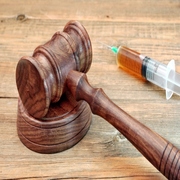Sept. 11: Week That Was in Healthcare Fraud and Malpractice

- Here is a general roundup of the past week’s developments in healthcare fraud and malpractice, as reported by the Department of Justice and the Office of Inspector General. The crimes reported below result in multiple millions of dollars in healthcare fraud and the possibility of extensive prison time.

Doctor pleads guilty in causing $4 million Medicare loss
Arthur Davida, MD, employer and part-owner of Home Care Physicians, Inc., pleaded guilty this week to a healthcare fraud charge where he permitted healthcare agencies to fraudulently bill Medicare for unneeded in-home treatment. Davida asked home-health agencies to certify patients as being confined to a home setting when “he knew” a minimum of 20 percent of patients was not confined to their homes. According to the Department of Justice, Davida provided the certifications fearing home-health agencies would otherwise simply stop sending referrals along.
According to Medicare mandate, patients must be certified as being confined to their homes before specialized nursing care can be paid for. Medicare paid over $20 million to home-health agencies because of Davida’s signed orders. Davida stated he was the cause of over $4 million in Medicare losses.
Alive Hospice pays $1.5M to resolve False Claims Act suit
The government has been reimbursed this week by Alive Hospice, Inc. – a Tennessee-based non-profit hospice care provider – with a $1.5 million payment for the suspected overbilling of both Medicare and TennCare for hospice services, reports the Department of Justice.
Medicare and TennCare hospice benefits and reimbursements are targeted towards those patients approaching the end of their lives, with a higher general inpatient reimbursement rate than that of home care or inpatient respite care.
According to the settlement, Alive, Inc. submitted Medicare and TennCare claims for general inpatient hospice care for unqualified patients. Alive paid over $1.5 million, over $1.4 million of which went to the U.S. and over $100,000 paid to the State of Tennessee. Linda Anderson, a triage nurse, will receive over $260,000 for bringing claims under the qui tam/whistleblower False Claims Act provisions where private citizens share information they possess about false claims on behalf of the government and are financially rewarded for doing so.
This is a notable trend among hospice providers, says Derrick L. Jackson, Special Agent in Charge at the U.S. Department of Health and Human Services, Office of Inspector General in Atlanta. “Providers are overbilling the Medicare program and taking advantage of patients at a particularly vulnerable point in their lives,” Jackson states. “HHS-OIG will continue to pursue providers who overbill these programs and will seek appropriate remedies through the U.S. Attorney’s Office,” he adds.
Additionally confirms Jack Smith, Acting U.S. Attorney for the Middle District of Tennessee, such hospice benefits are intended to soothe terminally ill patients. “We will continue to work to ensure that these benefits are used for these purposes,” Smith states.
Adds Attorney General Herbert H. Slatery III, fraud and abuse protection is imperative because of limited funding. “[We] must ensure that every dollar is spent on the care of those most in need,” he says.
